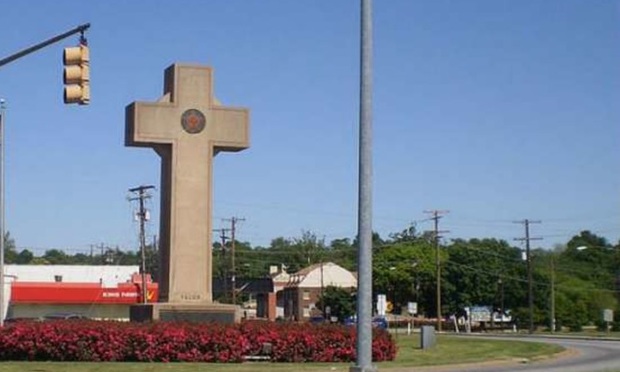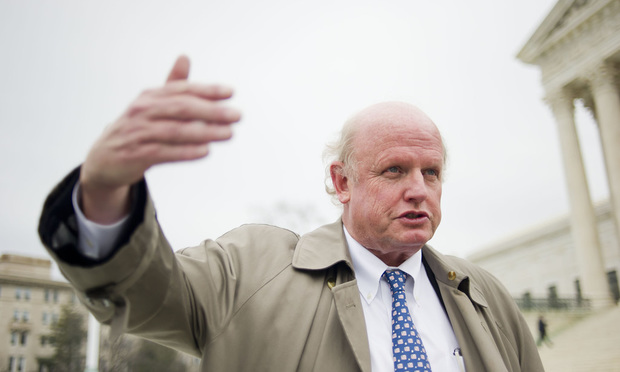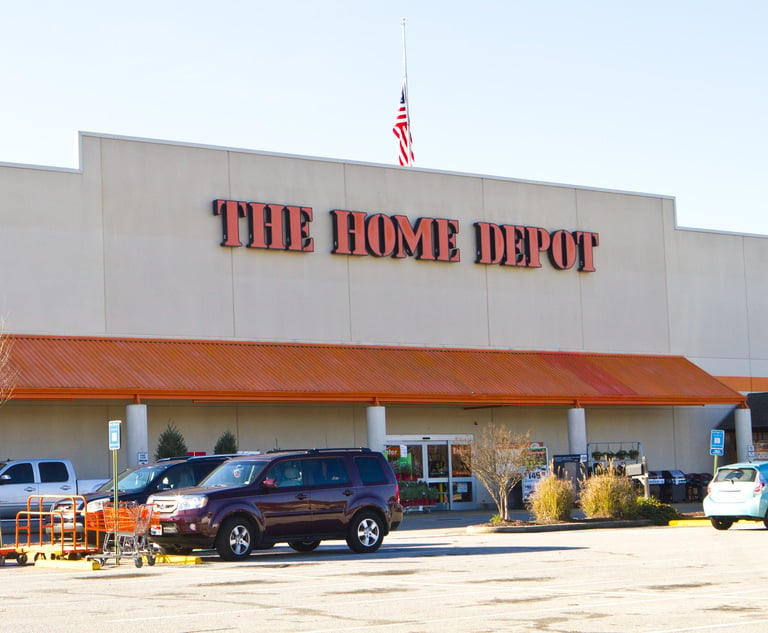Potential Blockbuster on Supreme Court Horizon Could Reshape Church-State Doctrine
A U.S. Supreme Court case testing the constitutionality of a cross-shaped memorial on public land in Maryland features myriad Big Law attorneys and a surprise amicus: William Suter, a former high court clerk.
August 23, 2018 at 12:07 PM
5 minute read
 Peace Cross in Bladensburg, Maryland. Credit: wikimedia.
Peace Cross in Bladensburg, Maryland. Credit: wikimedia.
So far, few marquee cases are lighting up the U.S. Supreme Court's docket for next term. But an important pair of cert petitions and accompanying amicus briefs, festooned with the names of notable lawyers, could energize the coming argument season.
The case tests the constitutionality of a cross-shaped memorial on public land in Maryland. “It strikes a lot of nerves,” said Baker Botts partner Aaron Streett, author of an amicus brief in the case along with Reagan administration Attorney General Edwin Meese III. “It's one of the few interesting cases this term.”
At issue is a 2017 ruling by the U.S. Court of Appeals for the Fourth Circuit finding that the 93-year-old World War I “Peace Cross” memorial in Bladensburg, Maryland, violates the Establishment Clause of the First Amendment. The panel asserted that the memorial, visible from a busy Route 1 intersection, “has the primary effect of endorsing religion and excessively entangles the government in religion.” The full court in March denied en banc review by an 8-6 vote. Three other circuits have ruled differently in similar cases.
“Left undisturbed, the decision below will have enormous consequences,” and could jeopardize hundreds of other cross-shaped memorials, Jones Day partner Michael Carvin wrote in a petition for the American Legion. The case is American Legion v. American Humanist Association.
“That decision is, to be blunt, grievously incorrect,” wrote Hogan Lovells partner Neal Katyal in a parallel petition in Maryland-National Capital Park and Planning Commission v. American Humanist Association. The commission acquired the cross in 1961.
Yes, Carvin, the conservative lawyer, is on the same side as Katyal, the former Obama administration acting U.S. solicitor general. If the cases are granted review, it is not certain which one will argue in favor of the memorial, though the justices tend to prefer hearing from government agencies rather than private groups.
 Michael Carvin after arguing for the plaintiffs in “King v. Burwell,” March 4, 2015. Credit: Diego M. Radzinschi / NLJ
Michael Carvin after arguing for the plaintiffs in “King v. Burwell,” March 4, 2015. Credit: Diego M. Radzinschi / NLJOther veteran advocates supporting the memorial in amicus briefs include Paul Clement of Kirkland & Ellis for the Veterans of Foreign Wars and Charles Cooper of Cooper & Kirk for 109 senators and members of Congress. Representing the humanist group in opposition to cert is its senior counsel, Monica Miller.
Here are some other notable aspects of the case:
>> Test for Brett Kavanaugh: If the memorial cases are granted and Kavanaugh is confirmed, it will be his first church-state case as a justice. On the D.C. Circuit, Kavanaugh wrote a concurrence in 2010 asserting that “so help me God” in the presidential inauguration oath was permissible. “Inaugural prayers,” he wrote, “typically include many references to God, Lord, and the like, which are considered non-sectarian for these purposes.”
>> A surprise amicus: William Suter has gone from clerk of the court to friend of the court. He is one of dozens of retired generals and flag officers signing onto Streett's amicus brief in favor of preserving the memorial. The court's clerk from 1991 to 2013, Suter was previously a judge advocate general for the U.S. Army. Suter said in an interview that he joined the brief as one of many military leaders who “believe deeply” that the Maryland memorial is an important symbol that should be preserved.
>> Fresh look at “Lemon test”: Carvin's petition invited the court to adopt a new test for determining whether a government action or statute violates the Establishment Clause. The strict Lemon test—named after the 1971 Lemon v. Kurtzman precedent—has been scorned by numerous justices, including the late Antonin Scalia, whose sentiment was memorialized in his bobblehead. Carvin, like others, wants a more permissive standard that mainly tests whether government is coercing religious practice.
>> Nonsecular Sekulow: A key member of President Donald Trump's legal team, Jay Sekulow, is still finding time to write amicus briefs for his organization American Center for Law and Justice, where he has argued numerous Establishment Clause cases in the past. His brief cites his “considerable legal expertise” in the issues raised by the Peace Cross case.
Read more:
New Disclosures Show Noel Francisco's Stock Sales Before SCOTUS Term
Hurdles Ahead on Brett Kavanaugh's Race to One First Street
Can Michael Cohen Say No to a Presidential Pardon?
A Record Number of SCOTUS Clerks Are Likely This Term—Thanks to Kennedy
This content has been archived. It is available through our partners, LexisNexis® and Bloomberg Law.
To view this content, please continue to their sites.
Not a Lexis Subscriber?
Subscribe Now
Not a Bloomberg Law Subscriber?
Subscribe Now
NOT FOR REPRINT
© 2025 ALM Global, LLC, All Rights Reserved. Request academic re-use from www.copyright.com. All other uses, submit a request to [email protected]. For more information visit Asset & Logo Licensing.
You Might Like
View All
4th Circuit Upholds Virginia Law Restricting Online Court Records Access
3 minute read
Supreme Court Considers Reviving Lawsuit Over Fatal Traffic Stop Shooting

Is 1st Circuit the New Center for Trump Policy Challenges?

Insurance Policies Don’t Cover Home Depot's Data Breach Costs, 6th Circuit Says
Trending Stories
- 1We the People?
- 2New York-Based Skadden Team Joins White & Case Group in Mexico City for Citigroup Demerger
- 3No Two Wildfires Alike: Lawyers Take Different Legal Strategies in California
- 4Poop-Themed Dog Toy OK as Parody, but Still Tarnished Jack Daniel’s Brand, Court Says
- 5Meet the New President of NY's Association of Trial Court Jurists
Who Got The Work
J. Brugh Lower of Gibbons has entered an appearance for industrial equipment supplier Devco Corporation in a pending trademark infringement lawsuit. The suit, accusing the defendant of selling knock-off Graco products, was filed Dec. 18 in New Jersey District Court by Rivkin Radler on behalf of Graco Inc. and Graco Minnesota. The case, assigned to U.S. District Judge Zahid N. Quraishi, is 3:24-cv-11294, Graco Inc. et al v. Devco Corporation.
Who Got The Work
Rebecca Maller-Stein and Kent A. Yalowitz of Arnold & Porter Kaye Scholer have entered their appearances for Hanaco Venture Capital and its executives, Lior Prosor and David Frankel, in a pending securities lawsuit. The action, filed on Dec. 24 in New York Southern District Court by Zell, Aron & Co. on behalf of Goldeneye Advisors, accuses the defendants of negligently and fraudulently managing the plaintiff's $1 million investment. The case, assigned to U.S. District Judge Vernon S. Broderick, is 1:24-cv-09918, Goldeneye Advisors, LLC v. Hanaco Venture Capital, Ltd. et al.
Who Got The Work
Attorneys from A&O Shearman has stepped in as defense counsel for Toronto-Dominion Bank and other defendants in a pending securities class action. The suit, filed Dec. 11 in New York Southern District Court by Bleichmar Fonti & Auld, accuses the defendants of concealing the bank's 'pervasive' deficiencies in regards to its compliance with the Bank Secrecy Act and the quality of its anti-money laundering controls. The case, assigned to U.S. District Judge Arun Subramanian, is 1:24-cv-09445, Gonzalez v. The Toronto-Dominion Bank et al.
Who Got The Work
Crown Castle International, a Pennsylvania company providing shared communications infrastructure, has turned to Luke D. Wolf of Gordon Rees Scully Mansukhani to fend off a pending breach-of-contract lawsuit. The court action, filed Nov. 25 in Michigan Eastern District Court by Hooper Hathaway PC on behalf of The Town Residences LLC, accuses Crown Castle of failing to transfer approximately $30,000 in utility payments from T-Mobile in breach of a roof-top lease and assignment agreement. The case, assigned to U.S. District Judge Susan K. Declercq, is 2:24-cv-13131, The Town Residences LLC v. T-Mobile US, Inc. et al.
Who Got The Work
Wilfred P. Coronato and Daniel M. Schwartz of McCarter & English have stepped in as defense counsel to Electrolux Home Products Inc. in a pending product liability lawsuit. The court action, filed Nov. 26 in New York Eastern District Court by Poulos Lopiccolo PC and Nagel Rice LLP on behalf of David Stern, alleges that the defendant's refrigerators’ drawers and shelving repeatedly break and fall apart within months after purchase. The case, assigned to U.S. District Judge Joan M. Azrack, is 2:24-cv-08204, Stern v. Electrolux Home Products, Inc.
Featured Firms
Law Offices of Gary Martin Hays & Associates, P.C.
(470) 294-1674
Law Offices of Mark E. Salomone
(857) 444-6468
Smith & Hassler
(713) 739-1250








